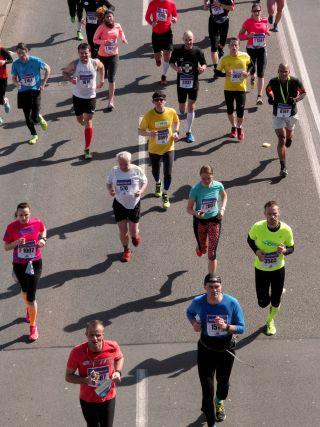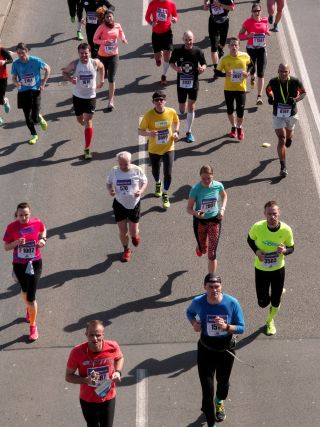What Happens in Your Body When You Work Out? Aerobics and muscle-building routines could extend your life. Reviewed by Vanessa Lancaster

KEY POINTS-
- Research shows that exercise may extend your life.
- Running and racquet sports bring the most benefits, but walking fast also works.
- An hour a day of fast walking may cut death risk by nearly 40 percent on average.
- Strength training can cut death risk by 15 percent.

For most of us, the first moment of aerobic exercise feels tough: your heart speeds up, you breathe slowly, and you might stiffen. Your body responds to exercise with a series of changes to make you stronger. We developed these survival responses back when we watched the sky for buzzards and had to outrun them to reach the juicy meat in a carcass before it was picked clean.
Now that steaks are sold at the supermarket, you won’t go hungry because you can’t run. But you’ll be healthier if you keep your body as close to savanna-ready as you can. You'll also boost your chance of living to a ripe old age.
What happens within your body during a workout?
When you’re exercising, let’s say running, some parts of your system shut down while others work harder. Your heart beats faster to pump blood to your muscles. Your digestion slows down. Your body works to increase oxygen flow and let go of heat and other by-products.
For the most intense movement–throwing a punch, lunging, sprinting–your body will supply all of your cells with several seconds worth of a fuel called "ATP."
Beyond those first few seconds, your muscles will tap into glycogen stores, which converts to ATP over a minute and a half. Lactic acid builds up in your muscles, creating an exercise “burn.”
After around two minutes, your body responds by increasing your access to oxygen: now you’re getting aerobic exercise. Oxygen helps you turn glycogen into glucose or draw glucose from your blood or food in your intestines.
To take in more oxygen, your lungs work more quickly. The fitter you are, the more oxygen you’ll get. To move the oxygen through your body, your heart rate and blood flow increase. Your heart is a muscle that gets bigger and more efficient with training. Top athletes can pump more than twice as much oxygen-rich blood per heartbeat than the average adult. So their hearts don’t need to pump as hard for the same amount of exercise and, at rest, may beat as little as 40 times per minute, compared to the average of 60 to 80.
As you work out, heat builds inside your body. Your blood vessels dilate to bring heat toward the skin and release it into the air, making your skin feel warm. Your face might turn red as well. Tiny tears occur in your muscles, making you sore. As the tears heal, you get stronger.
The whole experience is good for your brain, which responds by releasing feel-good chemicals. You’ll feel more alert and focused.
Aerobic exercise is a goldmine of health benefits. It helps pull you out of bad moods and fight mild depression; maintain a normal weight and avoid the many risks associated with obesity; prevent heart disease by cutting blood pressure and making your blood vessels less likely to get clogged with fat; and keep your body responsive to insulin–staving off diabetes, a condition in which you need extra insulin to maintain the right blood sugar levels. Exercise also helps prevent dementia and slow down milder mental decline with age.
And it could give you a longer life.
How much exercise do you need?
Adults need at least 150 minutes a week of some kind of “moderate” exercise; exercise is “moderate” if you need to breathe faster. In a large study of more than 270,000 older men, running and racquet sports, followed by walking for exercise, cut the risk of dying over the next 12 years most dramatically, but any exercise helped. Even just an hour a week of physical activity cut the average death risk by 18 percent in other research. Are you worried about cancer? In a 10-year study, regular physical activity cut the risk of colon, breast, kidney, and liver cancer.
If exercise is new to you, walking may be the best way to start. Aim to build up to about an hour a day. You could cut your death risk by an average of 39 percent.
Build muscle, too
Don’t neglect strength training. Lifting weights is one way to do it; you can also do resistance training exercises. Either can prevent falls and injuries, especially as you age, and make it more fun to engage in sports or play with the kids. In addition, building muscle will help you burn away fat, which is the most important part of maintaining a healthy weight.
Staying strong can also keep you alive. In a meta-analysis of 10 studies, researchers found that any amount of resistance training cut death risk by 15 percent and death from cardiovascular disease by 19 percent. To get the maximum benefit–cutting death risk by 27 percent, on average–you need about an hour a week of this kind of work.
- Questions and Answers
- Opinion
- Motivational and Inspiring Story
- Technology
- Live and Let live
- Focus
- Geopolitics
- Military-Arms/Equipment
- Securitate
- Economy
- Beasts of Nations
- Machine Tools-The “Mother Industry”
- Art
- Causes
- Crafts
- Dance
- Drinks
- Film/Movie
- Fitness
- Food
- Jocuri
- Gardening
- Health
- Home
- Literature
- Music
- Networking
- Alte
- Party
- Religion
- Shopping
- Sports
- Theater
- Health and Wellness
- News
- Culture

